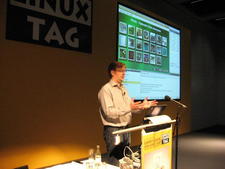LinuxTag 2009: GUIs of the Future with QML
In his keynote at the LinuxTag 2009 in Berlin, KDE founder Matthias Ettrich spoke about the future of user interfaces on mobile devices. In the process he presented QML, the newest development from his employer Qt Software.
Ettrich's talk was titled "New user interface paradigms on mobile devices" and addressed GUI developers. He began with a bit of history: ten years ago programming was at the forefront of development, with UIs "quickly assembled in about two hours." That has since change. Users now demand much more sophisticated UIs, and make purchasing decisions based on them.
The whole paradigm of GUI development has thus shifted. Graphics processing is faster, resolutions better and mobile devices provide new input mechanisms. These conditions, according to Ettrich, require diverging from the traditional development model. No more boxed, rectangular widgets. These components are much too difficult to turn on and off, scale or otherwise change, and don't allow consistent backgrounds.
"The boundaries should no longer be set only by technology but by the creativity of the developer," offered Ettrich. As a tool that represents this new style of thinking he presented QML, a declarative UI language from Qt Software's development lab in Brisbane, Australia. QML is an extension of the existing Qt Toolkit and is under LGPL licensing.
Ettrich showed some sample applications that he created onstage using Qt Creator to showcase the new QML language. He demonstrated the properties, states and transitions that are typical for QML.
A Qt Labs blog presents a video of QML in action and some sample code. It also includes links to the Windows binaries and Gitorious source code repository.
Subscribe to our Linux Newsletters
Find Linux and Open Source Jobs
Subscribe to our ADMIN Newsletters
Support Our Work
Linux Magazine content is made possible with support from readers like you. Please consider contributing when you’ve found an article to be beneficial.

News
-
Introducing matrixOS, an Immutable Gentoo-Based Linux Distro
It was only a matter of time before a developer decided one of the most challenging Linux distributions needed to be immutable.
-
Chaos Comes to KDE in KaOS
KaOS devs are making a major change to the distribution, and it all comes down to one system.
-
New Linux Botnet Discovered
The SSHStalker botnet uses IRC C2 to control systems via legacy Linux kernel exploits.
-
The Next Linux Kernel Turns 7.0
Linus Torvalds has announced that after Linux kernel 6.19, we'll finally reach the 7.0 iteration stage.
-
Linux From Scratch Drops SysVinit Support
LFS will no longer support SysVinit.
-
LibreOffice 26.2 Now Available
With new features, improvements, and bug fixes, LibreOffice 26.2 delivers a modern, polished office suite without compromise.
-
Linux Kernel Project Releases Project Continuity Document
What happens to Linux when there's no Linus? It's a question many of us have asked over the years, and it seems it's also on the minds of the Linux kernel project.
-
Mecha Systems Introduces Linux Handheld
Mecha Systems has revealed its Mecha Comet, a new handheld computer powered by – you guessed it – Linux.
-
MX Linux 25.1 Features Dual Init System ISO
The latest release of MX Linux caters to lovers of two different init systems and even offers instructions on how to transition.
-
Photoshop on Linux?
A developer has patched Wine so that it'll run specific versions of Photoshop that depend on Adobe Creative Cloud.

